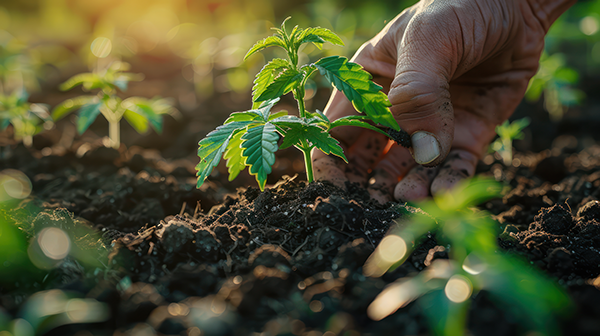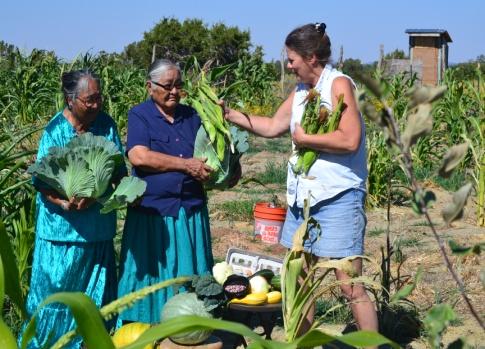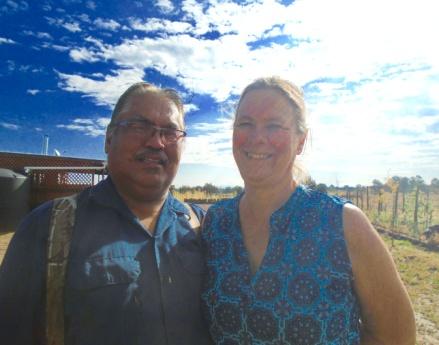Capturing Climate Solutions embedded with Indigenous Practices
James and Joyce Skeet Co-Founders
“Look deep into nature, and then you will understand everything better” Albert Einstein
When we heal our soil the nutrients in our foods return and restore nature’s balance. The answers that come from our ancient teachings look to nature as the ultimate solutions to adaptation and sustainable practices. Ancient people understood that plants are the mouth to the soil and channel liquid carbon back into a stable process by observing generation after generations of agriculture robust and self-sufficient methods. The microbes in the soil keep our soil healthy and provide all the nutrients in our foods, keeping climate stable and keep earth’s water cycles in balance.
Our vision is to approach natural systems to teach us the ethics of humility and wonder. People pursuing the production of their own food supply and connecting it to their cultural traditions, elevates farming to a spiritual/cultural practice. When we attempt to heal the land, we heal ourselves. 40,000 years of Indigenous agricultural knowledge shouldn’t be marginalized and discarded with synthetic inputs and modern technology. European agriculture has resulted in the demise of the ecosystem and loss of private property that connected us to our rich heritage and self-sufficiency. Land is not to be possessed and owned but to be used by all. A native elder was asked, “why do you eat on the ground and eat from one cook pot.” His response was, “I want to be close to the earth and eat together as one.”
Spirit Farm, the working farm of Covenant Pathways was developed to be a living example of how we can recover and reclaim traditional farming and spiritual practices, along with modern practices, to establish resiliency in our way of life, reducing the dependency on the very food system that is harming us. Spirit Farm uses all natural practices, including microbiological composting and biochar, to heal the brittle high desert southwestern soil. Our mission is to generate opportunities that impact individuals and communities with Native traditions that attach the human spirit to the Earth.
Ecology Land Restoration – Spirit farm employs methods of saving water on the land to replenish the aquafers. By slowing down and spreading out the rain that falls, it enables the water to soak into the ground, thus replenishing the aquafers. Traditions of dry farming and land contouring that address drought are complemented by rainwater catchment to reduce runoff and evaporative loss. Regenerative grazing concentrates enriching excrement that hoofs dig into the soil counteracting compaction, and boosting new plant growth in a natural, less-polluting cycle. Building swales and check dams across the landscape slow down the water and create growing spaces for small vegetation areas and potential orchards.
Our small herd of cows are moved monthly and fed hay on ½ acre paddocks 6-8 hours a day around the inner segment of the farm, a type of feeding referred to as bale grazing. They do not return to the same plot for 14 plus months. Their hooves reinvigorate the soil to open up pathways for dormant seed banks, while their saliva, urine and manure drop millions of microbes into the soil to feed the newly activated seeds and thriving desert plants. We are experiencing increased plant diversity and growth each year. Sometimes we plant cover crops to encourage additional plant biomass.
We are re-introducing the Landrace Churro sheep that are almost extinct to graze around the perimeter of the farm using shepherds. Their ancient instincts of plant medicine, land intelligence, and gentle grazing maneuvers are being restored and utilized to tread lightly across the fragile biocrust landscape while breathing life back into dormant soil microbes. These sheep provide high-quality meat rich in Omega 3’s for our traditional diet and ceremonies, wool for Navajo weaving and other wool technologies, and encourage climate restoration. Because of colonization, herders across the southwest have been forced to work with smaller acreage and as a result migratory patterns and nomadic grazing came to a complete halt. We are attempting to mimic grazing techniques owned by our ancestors but on a smaller scale with the Landrace Churro. The majority of the Churro sheep that are in existence today are considered ‘Modern Churro’ and have been bred with other breeds to increase the carcass size and create softer wools. The smaller landrace Churro are disappearing quickly and due to their small size move lightly on the desert landscape without destroying the delicate biocrust. Spirit Farm is co-facilitating a women led group to preserve and increase these unique Landrace Churro sheep.
Honor Water. We often in our modern-day perspective disregard how special and limited water is to our ecology. We have commoditized much of our living systems in nature as extractive and endless in quantity. To reference our western plateau of New Mexico, we do not have rivers running through our back yard and the water that is used is drawn from ancient reservoirs from below with much disregard to how long it has taken for nature to create these ancient waters. Wells have been extracted and mining has contaminated the ancient waters putting our area in a fragile and unpredictable future. Water has always been at the forefront of people that have inhabited and occupied our region. As indigenous people we have positioned ourselves to our climate and have celebrated our water system, relying on capturing and sequestering water from rainfall and protecting our springs with sacred respect.
Recent Technologies are sourcing the sun and wind for energy, and yet sourcing water has been given little attention, but rather colonization views water as a commodity, something to be extracted. On our farm there is no access to running water. We have large rain catchment tanks attached to every roof. This water is used in our growing spaces. When we run out, we haul water every day from the nearest town of Gallup, NM, 20 miles away. Our current collaborative community action plan considers water as sacred, and values sequestering water from rooftops and is developing additional action plans to keep the water on the land which in turn begins to refill our aquifers. This project also addresses saving water from urban rooftops to share with Native growers that have no access to water for growing food. We have placed our first tanks on an assisted living facility in Gallup and have begun hauling rainwater. This collaboration has much room to grow and expand to other communities and regions.
Sequestering rainwater from urban and village rooftops will assist the Indigenous growers and Spirit Farm to increase their growing capacity, provide opportunities for more Indigenous peoples to start a garden, allow the town of Gallup to be better prepared when water becomes scarce, as well as create an environment for different cultures to not only thrive, but work side by side to create solutions. Gallup and our local communities do flood during the monsoon season and most years provide water from melting snow.
Microbial Rich Compost – One hundred cubic yards of biological rich compost, produced through a closed system, is made on site annually. Compost and various compost applications increase soil bacteria and fungi which increases crop yields and reduces pests and plant disease. Increased yields result in more carbon sequestration, soil water retention, and restoration of natural water cycles.
Composting starts in the pens. Straw for bedding and biochar are added to the pens and the animals begin mixing their manure into the straw and biochar. The pens are cleaned several times a year and a few other organic materials are added. Our recipe for nutrient and microbial rich compost is 60% brown material, 30% green organic material and 10% fresh manure. Fresh manure is the activator to begin the breakdown of the compost pile. The compost is ready for gardens and fields in 6-8 weeks. The compost from our farm is shared with other growers and available for purchase.
Vibrant Healthy Soil Garden – Indigenous regenerative methods are incorporated along with modern scientific applications to produce abundant healthy foods grown without the chemicals and tilling that cause soil damage, kills the soil microbes, leaches the nutrients and accelerates climate change. Pruning, compost, mulch, and shade all contribute to our vibrant garden. Shade is key to moderate the extreme temperatures we experience in the Southwest. In addition, we designed a compost dosing pump that uses compost extract to neutralize chlorine, salts, heavy metals and mineralization in waters from municipalities and tainted wells. Research we completed several years ago confirmed that increased microbes in the soil increase the nutrients in the produce grown.
Poly-cropping is a form of planting we apply. You won’t find rows of beets, lettuce or beans, but rather all of the vegetables are mixed together with no two vegetables the same next to each other. This type of planting encourages increased diversity of soil microbes. Microbes are fed by the plant roots and just like you and me, want to be able to choose from a variety of foods and different foods for every meal.
Learning to interact with nature’s ecosystems and mimic ecological succession takes growing food to a new level. At Spirit Farm we observe and engage in this natural approach referred to as Syntropic Farming. With the understanding that plants themselves create fertility, external inputs are eliminated while plant diversity and stable soil organic matter increase. This is accomplished by the intentional pruning of plants and cluttering the surface with pruned material which dramatically accelerates the process of ecological succession and increases abundance. The core of Syntropic Farming is to understand that nature has more intelligence then we as human beings, therefore, our approach is to learn from nature.
We have garden produce available for barter. The concept of selling food to the community is a European concept, but to share in the abundance through barter is one way we contextualize indigenous agriculture. There are times we sell the food at the farm’s food stand to offer our community the experience of wonderful, sweet, tasting vegetables that can be grown locally. Folks like to come into the garden to pick their own food. This gives us a chance to explain to them how we grow nutrient rich foods.
This year, 2024, we have incorporated an Agrovoltaics system in the garden. We have 24 solar panels raised up off the ground 6-8 feet and growing underneath them. The solar panels provide shade and a reprieve from the hot sun. Several times a year we look for the soil microbes under the microscope and find that the best results are always found in our shady spots. During the hot summer months, the garden is a favorite spot to hang out, with chairs and benches to relax and enjoy silence or invigorating conversations.
Bio Char – Our ancestors periodically burned parcels of land which created charred residues that built habitat for soil microbes. We are using batch-produced biochar for improving microbe density, water retention, carbon capture, and crop and rain production. We have 3 different types of units that make biochar. The Ring of Fire unit can be transported taken into the woods to make char from the dead trees from the beetle bark kill. Another unit is small and handmade. It is perfect for the backyard grower. Then there is WALL-E, our highly engineered unit that uses the heat from the burning char to heat a tank of water that is then pumped 18” under the soil in our greenhouse. Biochar is added to thermal and static compost, worm compost, mixed with seed start soil, planted along with seedlings, distributed in the grazing and cover crop plots and fed to all the animals to increase immune and healthy gut systems. The Biochar the cows and sheep eat is inoculated with millions of microbes as it passes through their digestive system and deposited on to the land while grazing. Bio char has been used by our ancestors in the western hemisphere for increasing yields to maintain and sustain large populations prior to the year of 1491.
Clean Sweet Meats – In addition to adding biochar to the animal feeds, we are fermenting grain and beans that is fed to our animals; chickens, turkeys, pigs, sheep and cows. Fermentation of feeds is a very easy application that removes the chemical fertilizer toxins from the trash grains we source from local agricultural conventional farms. Fermentation also increases the bioavailability of the nutrients in the grains and adds microbes to the gut microbiome. When sent to the lab for testing, our pork meat had healthier fats than pigs grazing 50% on pasture. In the desert we don’t have the luxury of pasture, and this has provided us with an inexpensive healthy alternative approach. We are in the middle of research right now to determine additional benefits from feeding biochar to our animals, including if PFA’s (the forever chemicals) can be reduced in chicken eggs. Recent studies have found PFA’s in organic chicken eggs from the fish meal added to the organic chicken feeds.
We do not give our animals antibiotics. It taints the meat, reduces the nutrients in the meats and kills the microbes inside the animal’s digestive systems. It also kills the microbes on the soil for up to four months when the animal excretes. Since our farm makes microbial rich compost, we need healthy microbial rich manure. Much of our meat sales and bartering has made Spirit Far a local stop for many that do not have access to affordable clean meats. Spirit Farm is now an approved supplier for USDA meats for the pigs, sheep and cows. We are expanding to assist other local growers to attain their USDA certification and provide training, resources and supplies to support their efforts to also provide clean sweet meats to local schools, colleges, institutions and other markets.
Our quest to honor and perpetuate our culture and fulfill our obligation to care for the Earth is shared by hundreds of other Tribes who also have suffered from dislocations and environmental damage. We are developing an adaptable, effective, and affordable framework to share with them to support our common desire to transform our communities, advance climate and social justice, and build resilience for the future. Our Navajo bio-cosmology rejects a reductionistic view of agricultural science and instead teaches that biology must be understood through the lens of spirituality. Our heritage teaches us to understand the land, the people and the climate through a framework that leads to flourishing results. We have a deep, rooted cosmology in regards to Indigenous Regenerative Intelligence. At Spirit Farm we are embracing nature’s solutions by embedding Indigenous practices. We must quickly stir the sleeping giant.



